
United in Resolve and Hope
December 13, 2023
Related:
Nearly two years after the full-scale Russian invasion, Ukrainian students find refuge in a community of scholars with a long history of supporting those impacted by war.
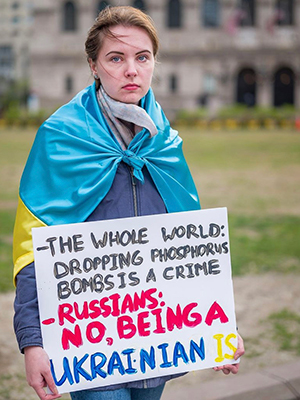
Yulia Bychkovska was in Boston in February 2022 when Russian missile attacks struck a mostly residential area west of her home in Zhytomyr, Ukraine. Though she was in the U.S., she learned of the invasion before her mother.
“I had to call my mom and wake her up to tell her the war had started,” said Bychkovska, who had recently completed a bachelor’s degree at Columbia College in Missouri. “I was very worried because I didn’t know what was happening on the ground. All I knew was this terrible news.”
In the days that followed, she would call family just before she went to bed to check on them, and then do the same as soon as she woke up. “I didn’t know if I would see them again,” she said.
Around the same time, Bychkovska learned she had been accepted to the Maxwell School of Citizenship and Public Affairs to pursue dual master’s degrees in public administration and international relations. It was a dream realized, but she knew she couldn’t begin her studies that July unless she returned to Ukraine to see her loved ones.
Without telling them, she boarded a plane for Poland and then embarked on a 16-hour bus ride home. The arduous route took her past the remains of shelled buildings and other signs of war. Though it was painful to see the destruction, she was relieved to be home. “I wanted them to know I didn’t abandon them,” she said of her family. “Also, in some ways it gave me peace of mind because I knew what my parents were doing, how society acted in war, and that they had some protections in place like the warning sirens.”
Bychkovska’s mother made her promise she would cut her visit short and return to the U.S. if their city was attacked. The day dozens of bombs exploded nearby, Bychkovska’s mother said, “It’s time to go.” She packed her bags and quickly returned to the U.S.
Soon after, Bychkovska began her Maxwell studies.
Nearly two years into the invasion in Ukraine, she and other students from the embattled country carry what few of their classmates can comprehend—worry for their loved ones back home, and sometimes, feelings of guilt for having been afforded such opportunity.
But they find refuge joining a community of scholars with a long history of supporting those impacted by war and the unique opportunities to collaborate, research and influence policy in support of Ukraine’s sovereignty.
Veterans Bridge
The US-Ukraine Veterans Bridge brings experts from the U.S. veterans’ community together with officials in Ukraine to support its bourgeoning veteran population and build national security. The leading academic partners in the relatively new coalition are two Maxwell professors, the Hon. James E. Baker and Vice Admiral Robert Murrett (U.S. Navy, retired).
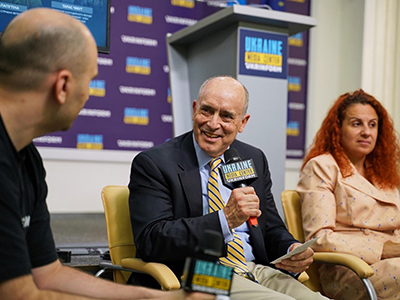
Baker, a highly regarded national security lawyer, policy advisor and former chief judge of the U.S. Court of Appeals for the Armed Forces, and Murrett, a principal investigator of the Intelligence Community Center for Academic Excellence, are aligning resources from Syracuse University and offering their expertise. The coalition works with the Ukraine Veterans Foundation (UVF), and it includes veterans from the U.S. and Ukraine and leaders in areas such as health care, benefits administration, education, employment, reintegration and family.
The professors, who serve as the director and deputy director of the Syracuse University Institute for Security Policy and Law, invited Yulia Bychkovska and fellow Ukrainian student Eduard Gusak to participate in meetings where they get to witness and take part in international collaborations to build their country’s national security.
“The students bring important perspective to our work in support of Ukrainian security, both in terms of direct contact with counterparts in Kyiv and in assisting Maxwell students in relevant research and programs dealing with the effects of the Russian invasion,” said Murrett, professor of practice of public administration and international affairs. “For example, both Yulia and Eduard have a role in a current master of public administration workshop, a semester-long student research effort which evaluates comparative veterans’ support programs and is sponsored by the UVF.”
Veterans Bridge meeting participants sometimes include Nataliia Kalmykova, a Fulbright scholar who became executive director of the UVF weeks before the Russian invasion. Now one of Ukraine’s deputy ministers of defense, she visited Syracuse University last spring and met with Baker, Murrett, Maxwell Dean David M. Van Slyke, Ukrainian students and numerous other University representatives, including from the D’Aniello Institute for Veterans and Military Families.
The students have gained experience in international collaboration and crisis response as well as a deeper understanding of the relationship between the care and treatment of veterans and national security.
“A society of demobilized veterans can be a force for good, as the World War II G.I. Bill boom demonstrated in the United States,” Baker explained in a position paper he recently shared with the U.S. government and Ukraine’s Ministry of Veterans Affairs. “It can also result in instability if those veterans are alienated from society or government and subsequently mobilized as a political movement or military force,” he wrote.
‘A way of paying it forward’
Early last July, Eduard Gusak and other incoming M.P.A. students began their year-long academic journey with a two-day colloquium that serves as an in-depth orientation and networking opportunity.
One of the colloquium events, “What is a public service perspective?” included a Ukrainian-American, Mark Temnycky ’17 M.P.A./M.A. (IR).
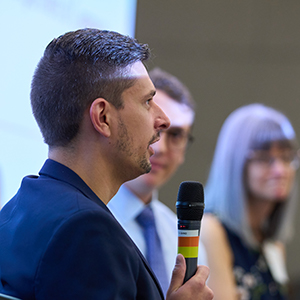
Temnycky, who is a defense contractor, a nonresident fellow at the Atlantic Council’s Eurasia Center and a freelance journalist, writes about the war for major outlets like The New York Times and recently received the Ukrainian World Congress’ inaugural “Ukrainian diaspora 30 under 30” award. He was also recognized by the International Sports Press Association for his coverage of the Russian invasion. He shared some of the pivotal opportunities he took advantage of while studying at Maxwell, including an internship with NATO and work for the Ukraine Parliament. “I always had this desire for public service,” he said.
Of his writing, he added, “It is a way of paying it forward and informing people what’s happening.”
Gusak was inspired by Temnycky and fellow panelists. He appreciates the opportunities he has been afforded, for instance joining the US-Ukraine Veterans Bridge meetings and working as a research assistant to his professor, Robert Murrett.
Murrett and other faculty often ask him to consider how he might apply what he learned back home. “For now, I have experienced the hardest period in my life, but on the other hand, I am being provided opportunities to learn from people with an enormous amount of life experience and a willingness to help,” said Gusak. “The reason why I came here is because of the opportunity to gain this experience to influence Ukraine’s future.”
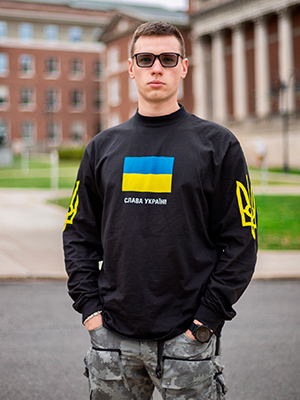
Gusak was home in Kyiv when Russia invaded. Shortly after, his parents asked him to bring his older sister to Slovakia, where she would be safer. While there, he received a call from Gennady Bratslavsky, a family friend who is chair of the urology department at Upstate University Hospital in Syracuse.
Gusak told Bratslavsky he considered returning to Ukraine, but as a young man he knew he would return to a higher level of responsibility while his country was at war. He didn’t expect he would be called to service in the military; a supporting role in government seemed more likely given his background—he’d received a bachelor’s degree in political science and government from Taras Shevchenko National University of Kyiv.
Bratslavsky told Gusak about a new program that enables Ukrainians to come to the U.S. with the support of a sponsor. He mentioned opportunities at Syracuse University and the Ukraine 1991 Foundation, a nonprofit he co-founded that provides humanitarian aid to the frontlines.
In August 2022, Gusak relocated to Syracuse to stay with the Bratlavskys. He enrolled at the English Language Institute at Syracuse University’s College of Professional Studies to improve his fluency, and he applied to Maxwell.
When he learned he’d been accepted, he said he “almost jumped to the sky” from excitement.
Community of Scholars
Maxwell is home to a community of faculty who research the rule of law, international politics, and peace and security, and are helping build networks of scholarship and training to support democracy in Ukraine.
In addition to his work with the US-Ukraine Veterans Bridge, James E. Baker is leading another effort, Ring Around Russia: Partnership for Law and Policy, which has brought together scholars from 11 universities in the U.S., Ukraine, Estonia, Finland, Georgia, Latvia, Lithuania, Norway, Poland, Romania and Slovakia. Their goal is to develop each nation’s abilities in intelligence oversight, national security decision-making, the regulation and use of emerging technologies, and responding to Russian disinformation.
Baker, who is a professor of public administration and international affairs by courtesy appointment, was inspired to develop Ring Around Russia following a series of remote lectures he held two weeks before the Russian invasion. His audience included academics, lawyers and government leaders in Ukraine, who kept returning to a central question: Does law matter when a nation faces an existential threat? “I had heard that question before, in the U.S. government,” Baker said. “Ring Around Russia is my answer.”
He has since traveled throughout frontline states to meet with university scholars, government officials and civil society groups.
“Many of these countries are evolving from post-Soviet systems,” he said. “Our network of scholars is trying to spread the word: Good process leads to better results and the good faith application of law protects democracy and enhances our physical security by making our security services more professional and effective.”
Baker’s travels this past year have included two trips to Ukraine, the most recent of which was in June and included 16 meetings and a television appearance during which he advocated for the care of Ukrainian veterans.
“The scope of the destruction Russia has wrought is criminal and tragic,” he said, “but I feel hope and optimism observing this generation of civil society leaders in Ukraine, as well as the resolve of Ukraine’s leaders. The people of Ukraine are resilient. It is hard to describe how resilient until you hear person after person declare ‘We are Ukraine’ and ‘We will win this war.’”
Meanwhile, Michael Williams, associate professor of public administration and international affairs, has spent the fall semester in Brussels, Belgium, home of the headquarters of the North Atlantic Treaty Organization (NATO), where he is advancing his project, “Origins of War: NATO-Russia Relations, 1989–2022.”
The trip is funded by a Fulbright-NATO Security Studies Award and hosted by the Centre for Security, Diplomacy and Strategy at the Brussels School of Governance. Williams’ research has included collecting oral histories “to document how the alliance has worked to coordinate assistance to Ukraine and respond to the crisis.”
Another Maxwell faculty member, Brian Taylor, frequently provides expert commentary on Russian politics to major media outlets such as Forbes, Reuters and Newsweek. His book, “The Code of Putinism” (Oxford University Press, 2018), shows how the mentality of Russian President Valdimir Putin has shaped the country’s politics over the past two decades.
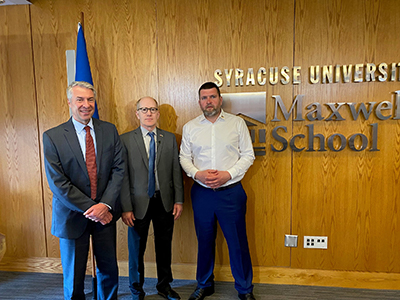
Within days of the Russian invasion, Taylor joined Williams and faculty colleagues Osamah Khalil, professor of history and chair of the International Relations Undergraduate Program; Catherine Bertini, professor emerita of practice of public administration and international affairs; and Margarita Estévez-Abe, associate professor of political science and co-director of the Center for European Studies, for a panel titled, “What’s at Stake in Ukraine.”
Taylor, professor of political science and director of the Moynihan Institute of Global Affairs, also helped organize a visit last spring by Oleksandr Markushyn, the mayor of Irpin, Ukraine, who was in Syracuse to sign a sister city proclamation. Markushyn—who was awarded the Order for Courage by Ukrainian President Volodymyr Zelenskyy—shared with students, faculty and staff how he and fellow civilians joined Ukrainian forces to defend their city.
More recently, Taylor served on the University committee that brought Visiting Assistant Teaching Professor Tetiana Hranchak to the Maxwell School for the academic year through the Scholars at Risk Network. She fled Ukraine, fearing her research on the “politics of memory” would put her at risk (see related story below).
Empowered and Grateful
For her M.P.A. capstone, Yulia Bychkovska researched the effectiveness of U.S. economic sanctions on Russia for the Washington, D.C., based Rand Corp. Her work resulted in a co-authored paper, with an abridged version published by The Hill in August, “How to make sanctions on Russia more effective.”
The byline motivated more writing. In October, Bychkovska co-authored a piece for the Atlantic Council, “By the numbers: Here’s how turmoil in Congress could impact U.S. aid to Ukraine.” She wrote it as an intern for the Council’s GeoEconomics Center; she’s a young global professional assigned to its Economic Statecraft Initiative. She has found her niche in economics, and like Gusak, hopes to return to Ukraine to help assure its independence and rebuild.
“Writing gives me a voice,” she says. “It’s another way to bring attention to what’s happening.”
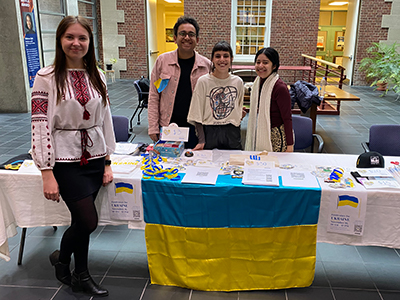
Gusak and Bychkovska have also found a sense of empowerment by raising funds and gathering supplies to help those affected by the war.
Bychkovska organized a fair to support United24, an initiative by the president of Ukraine to collect donations. “I was very thankful for my classmates who are not Ukrainian who stepped up and helped me,” she said, adding that professors also helped—for instance, Peter Wilcoxen, professor of public administration and international affairs, purchased Ukrainian flags for faculty offices.
Gusak, meanwhile, volunteers as the project delivery manager for the Ukraine 1991 Foundation, run by Gennady Bratslavsky. It has received and distributed over $1 million in medical supplies and other donations.
The students have also found a sense of community with the University’s Ukrainian Student Association. As president, Gusak welcomes everyone and strives to build awareness not only about the plight of his country at war, but also its history and cultural traditions.
“There is a relatively small population at the University,” he said, “so this is building a larger community of support.”
Bychkovska sometimes thinks back to her introduction to Maxwell.
In Boston, two days after the full-scale invasion, she received a message from her future professor, Michael Williams.
Williams saw that she was among the applicants, and that she was from Ukraine. He asked if she and her loved ones were safe. “That meant a lot,” she said. “He may not remember it now, but for me, it really showed me how much the community cares.”
Gusak echoed the sentiment. He recently gave his professor, Robert Murrett, a Ukrainian coin as a small gesture of gratitude. “He told me, ‘I am sorry I don’t have anything for you,’” recalled Gusak. “I explained to him that the best gift for me is knowledge that he is sharing with me.”
By Jessica Youngman
Published in the Fall 2023 issue of the Maxwell Perspective
Related Stories
‘We Left Everything Because Life was More Precious,’ says Visiting Scholar from Ukraine
Alumnus Dmytro Kuchirka Hopes to Return to Ukraine ‘to Make Life Better’ and Help Rebuild
Alumna Strives to Keep Her Longtime Home in the Forefront
Faculty Lead Partnerships to Support Ukrainian Veterans, Strengthen European and US Security
Michael Williams Honored with NATO-Fulbright Security Studies Award
Related News
Commentary

Apr 27, 2024
Commentary
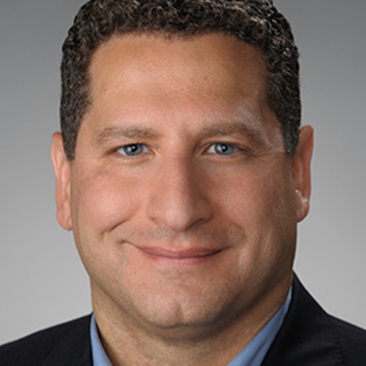
Apr 23, 2024
Commentary
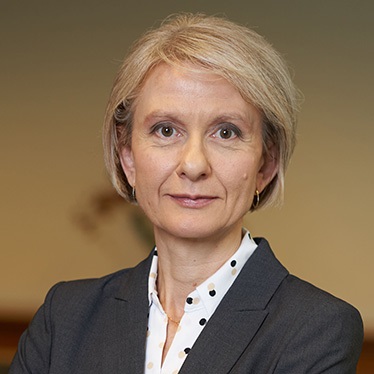
Apr 22, 2024
